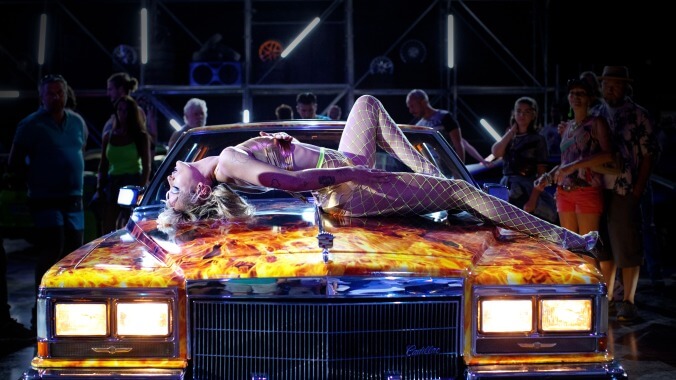Horniness for cars is just one outrageous aspect of this year’s Cannes winner, Titane
The director of Raw returns with an erotic whatsit that’s ferocious, twisted, and kind of sweet

Describing the plot of a movie is one of the basic duties of a film review. But sometimes a plot resists description, because it’s too ambiguous to put into words or because doing so would spoil the element of surprise. Both reasons apply to Titane, the second feature from French director Julia Ducournau, who turned heads and stomachs with her debut, the cannibal coming-of-age story Raw. Summarizing her new film would be both difficult and a buzzkill.
So let’s just say that the surprise winner of this year’s Palme d’Or, a.k.a. the top prize at the Cannes Film Festival, is about bodies. Young bodies with skin pulled tight over rock-hard muscles, and aging bodies desperate to recapture the suppleness of youth. Traumatized bodies, uncontrollable bodies, bodies in the midst of transformation. There are a lot of wild twists and turns in this movie, but underneath there’s a constant: the agony of being trapped inside of a human body, and the itchy, restless desire to transcend it.
Ducournau’s work is sometimes compared to that of David Cronenberg, and that rings true in the sense that both are obsessed with the erotics of disgust and the possibilities of a “new flesh.” Yet the similarities between Titane and Cronenberg’s Crash have been overstated. After all, a sexual predilection for cars is only one aspect of our heroine, Alexia (Agathe Rousselle), and her fucked-up psyche. In the opening scene of the film, we see her as a young, defiant girl, kicking the back of her father’s car seat as they speed along a French coastal highway. The resulting crash and installation of a titanium plate in her skull should tamp down her rebellious spirit. It doesn’t.
Throughout the film, an adult Alexia acts impulsively and in her own self-interest, her motivations a mystery seemingly even to herself. Is she the way she is because of the metal in her head, whose presence is continually announced by a bulbous scar shaped like a fiddlehead fern? Or was she a ferocious creature even before the crash, one whose inborn capacity for violence was simply brought to the surface by severe childhood head trauma? Ducournau leaves this question open-ended, providing few solid answers.
If bodies are a prison in Titane, gender is especially so. Early on, Alexia is working as a model at a car show, sinuously writhing on the hood of a flame-painted Cadillac for the pleasure of a crowd of (mostly male) onlookers. Ducournau films this hyper-feminine performance in sexually charged close-up, then proceeds to complicate it throughout the rest of the film. The theme becomes even more prominent when Alexia ends up crashing, through complications best not disclosed here, at a firehouse led by the grizzled Vincent (French star Vincent Lindon). Where Raw used a scene of vet school students partying to represent adolescent sexual awakening, Titane accentuates the gendered symbol of the hunky firefighter under angelic white light and sprays of beer from red plastic cups. Rousselle, in her first feature film role, spends much of the movie naked, albeit wearing a prosthetic. The body horror is in your face, and so is the gender commentary.
A few stylistic flourishes, like the Dario Argento-style colored lighting and the ominous chanting that lends a sense of doom to Jim Williams’ score, carry over from Raw. (Williams and cinematographer Ruben Impens both worked on that film, too, so there you go.) Others are newly accentuated: The retro-kitsch needle drops gain a pulpy, Tarantinoesque resonance by being paired with scenes of extreme violence. Although this film is too inscrutable to work as a true midnight crowd-pleaser, gore hounds will appreciate one sadistic kill involving a bar stool, set to The Zombies’ “She’s Not There.”
Titane has a wicked sense of humor as well, and at times it seems as though the whole thing is a bit of a laugh for Ducournau, who works out a complicated tangle of themes in heightened, surrealistic fashion. Eventually, the movie takes an unexpected turn for the sweet—although, naturally, not without shades of perversity. The broadly sketched characters and ambiguous motivations make this shift a bit difficult to swallow, but the fact that Alexia and Vincent, both weirdos in their own right, might have some affection for each other is no more baffling than anything else in the film.
In both of her features, Ducournau has displayed a fascination with feral femininity and the animal side of human nature. And anyone who’s lived with animals knows that they operate under their own logic, one that has nothing to do with “civilized” morality. To that end, Titane is a bit like a pet cat dropping a dead mouse at its person’s feet: It’s shocking, and kind of gross, but deep down, a loving gesture.